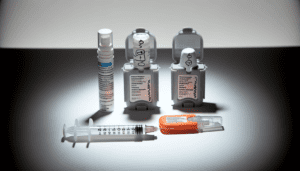Are you or a loved one dealing with addiction and looking for the right type of treatment? Understanding the difference between acute care and long-term care is essential for making informed choices about recovery. Each care type serves specific purposes and meets different needs, so let’s explore how both can support individuals on their journey toward healing and sobriety.
Key Takeaways
- Learn about the differences between acute care and long-term care in addiction treatment.
- Identify which care approach fits best with individual needs and recovery goals.
- Explore the benefits and limitations of both acute and long-term care options.
Understanding Acute Care and Long-Term Care in Addiction Treatment

Addiction is a chronic disease that often requires a range of treatment options tailored to an individual’s specific circumstances. Acute care focuses on immediate stabilization, while long-term care emphasizes ongoing support and rehabilitation.
Successful recovery involves a comprehensive approach that may include both types of care, addressing not only the physical aspects of addiction but also emotional and psychological factors. Whether you’re seeking immediate help or a sustainable recovery plan, knowing these two models of care can help you make informed decisions.
The upcoming sections will walk you through the process of:
- Identifying acute care options for immediate support.
- Exploring long-term care facilities and programs for sustained recovery.
- Understanding how to choose the right care model for your situation.
This knowledge will empower you to make confident choices that optimize recovery outcomes for you or your loved one.
Identifying Acute Care Options for Immediate Support
Acute care plays an important part in the initial stages of addiction treatment. It primarily focuses on managing severe withdrawal symptoms, medical complications, and psychological crises. Acute care is typically delivered in hospitals, detox centers, or specialized treatment facilities.
Emergency Medical Care
In urgent situations, individuals may require emergency medical care to address life-threatening withdrawal symptoms or overdose. Facilities equipped with 24/7 medical supervision provide essential interventions to ensure safety and stability.
Detoxification Services
Detoxification is often a key component of acute care, involving medical supervision to safely manage withdrawal symptoms. This process can last from a few days to several weeks, depending on the substance used and the individual’s health status. During detox, healthcare professionals monitor vital signs and administer medications as necessary to alleviate discomfort and prevent complications.
Exploring Long-Term Care Facilities and Programs for Sustained Recovery

Long-term care involves ongoing treatment and support designed to encourage lasting recovery. These programs typically span weeks to months and focus on addressing the underlying issues that contribute to addiction. Long-term care options include residential treatment facilities, outpatient programs, and sober living environments.
Residential Treatment Programs
Residential programs provide immersive support in a structured environment, allowing individuals to focus entirely on recovery. These programs offer various therapies, including individual counseling, group therapy, and holistic approaches, enabling participants to develop coping strategies and rebuild their lives.
Outpatient Programs
For those who may not need 24/7 supervision, outpatient programs offer flexible treatment options. Participants attend scheduled therapy sessions while managing their daily responsibilities. This model allows individuals to integrate recovery into their lives while receiving essential support and guidance.
Sober Living Environments
Sober living houses provide a supportive environment for individuals in recovery, emphasizing accountability and community. These settings often require residents to follow house rules and participate in recovery-oriented activities, facilitating a smoother transition back into society.
Understanding How to Choose the Right Care Model
Selecting the appropriate care model is essential for achieving optimal recovery outcomes. Consider the following factors when making your decision:
- Severity of Addiction: Individuals with severe addiction may benefit more from acute care, while those in stable recovery might find long-term care more suitable.
- Personal Needs: Evaluate personal circumstances, including support systems, financial resources, and the ability to commit to a structured program.
- Co-Occurring Disorders: If there are underlying mental health issues, seeking integrated treatment options in long-term care may be beneficial.
By carefully assessing these factors, individuals can choose a treatment model that aligns with their goals and maximizes the chances of sustained recovery.
Local Resources for Addiction Treatment
In Spokane, WA, various treatment facilities and resources are available, offering both acute and long-term care options. State-certified chemical dependency treatment centers, detox programs, and outpatient services cater to diverse needs. Whether you’re looking for immediate support or ongoing recovery programs, Spokane provides a range of resources to help you or your loved one on the path to healing.
Summary
In conclusion, understanding the differences between acute care and long-term care in addiction treatment is vital for navigating the recovery journey. By identifying the right approach, individuals can access the support they need to overcome addiction and build a fulfilling life in sobriety. Remember, the road to recovery may be challenging, but with the right resources and care, lasting recovery is within reach. For further reading and resources, visit Addiction Help Finder contact and resources, where you’ll find a wealth of information to guide you on your recovery journey and inspire you with stories of hope of our neighbors in the Spokane community.
Frequently Asked Questions
What is the duration of acute care for addiction treatment? Acute care typically lasts from a few days to a few weeks, depending on the individual’s needs and withdrawal severity.
Can I transition from acute care to long-term care? Yes, many individuals begin with acute care and then transition to long-term care to address ongoing recovery needs.
Are there specialized programs for dual diagnosis? Yes, many long-term care facilities offer specialized programs for individuals with co-occurring mental health disorders and substance use issues.
How can family members support a loved one in recovery? Family members can play a vital role by participating in family therapy, providing emotional support, and fostering open communication throughout the recovery process.










